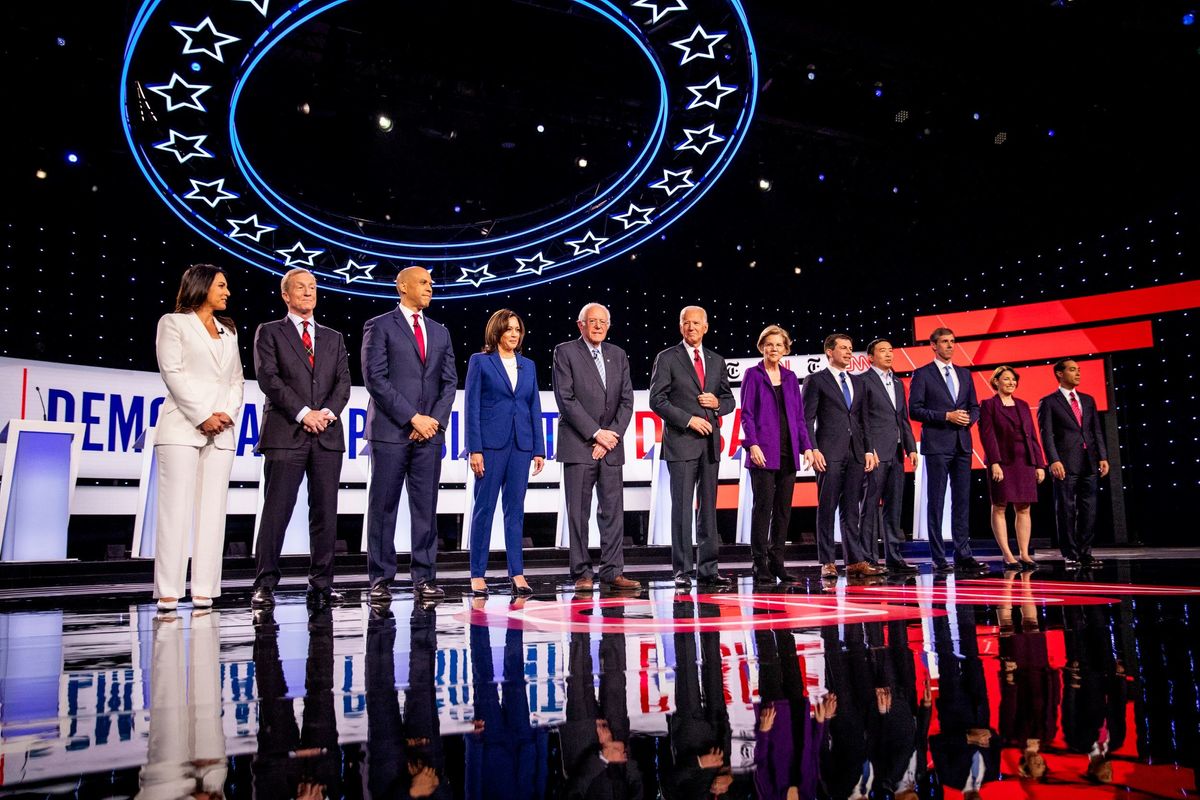Foreign policy played a bigger role in last night's Democratic presidential debate than in previous ones, in part because of events that came on the heels of President Trump's surprise, and disastrous, withdrawal of US troops from northern Syria. Some candidates used the opportunity to play up their foreign policy bona fides, but not all of their punches landed cleanly. Here are some key takeaways.
Everyone agrees Trump betrayed American allies: Predictably, most candidates hammered home that Trump's drawdown in Syria – paving the way for Turkey, Russia, Syria's Bashar al-Assad, and maybe ISIS to move in – was a major betrayal of America's Kurdish allies, who bore the brunt of the fight to defeat ISIS's self-proclaimed caliphate. Pete Buttigieg, mayor of South Bend, Indiana, said that this was a major blow to US credibility on the world stage, a sentiment echoed by senators Amy Klobuchar and Kamala Harris. Former housing secretary Julian Castro also said that the way to regain trust from allies "is to boot Donald Trump out of the Oval Office." Former Vice President Joe Biden agreed, too, saying it "was the most shameful thing any president has done in modern history in terms of foreign policy."
No one had a plan to disentangle the US from Syria: Most of the candidates think US troops shouldn't be in that country indefinitely, but no one had a clear plan of how to deal with the shambolic consequences of a withdrawal. Congresswoman Tulsi Gabbard, well-known for her strange affinity for Syrian dictator Bashar al-Assad, criticized the US presence in Syria, arguing that the slaughter of Kurds was a consequence of the American "regime change war." But she missed the mark. If there's one thing neither Presidents Obama or Trump had any interest in doing, it was overthrowing the Syrian regime. Meanwhile, when asked about Syria, Biden – the foreign policy heavyweight of the bunch – did what he's done on many recent debate stages – he demurred, obfuscated and bumbled: "I'd let him [Turkey's President Recep Tayyip Erdogan] know he's going to pay a heavy price for what he has done. Now pay that price." How? No answer.
Did the front runner run from foreign policy? With the exception of Biden, foreign policy isn't the pack's strong suit – and it showed. Front runner Elizabeth Warren, who welcomed opportunities to speak about other signature policy proposals, such as on taxes and jobs, didn't raise her hand to weigh in during the foreign policy round, and spoke less during this discussion than any other part of the debate.
No more foreign wars: Senators Warren and Sanders, both populist Democrats, have long opposed American intervention in foreign conflicts. But while they lumped criticism on Trump for the abrupt troop pullout, they both remain closer, in fact, to Trump's stated ideas than to their centrist Democrat rivals in the view that US troops really shouldn't be fighting in far-flung conflict zones at all: "I don't think we should have troops in the Middle East," Warren said. And the Horseshoe theory comes full cir–– er, horseshoe..)
No surprises on Russia: Russia was criticized across the board for interfering in America's democracy, and that of its allies. The candidates blamed Trump for failing to hold Vladimir Putin to account.
There was one glaring omission: Despite weeks of controversy about the NBA's response to Chinese censorship, months of Hong Kong protests, and more than a year of the US-China trade spat, there wasn't one question about China, arguably the most consequential foreign policy issue of our time.
CORRECTION: We have added more detail on Julian Castro's views on foreign policy.



















